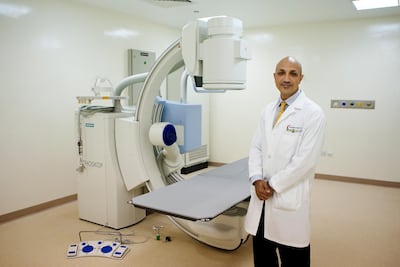More than two thirds of men in the UAE are putting themselves at risk of prostate and testicular cancers by not knowing the symptoms of the disease and failing to schedule an annual check-up with their doctor, a new study has revealed.
A survey of 1,000 people living in the UAE, commissioned by Cleveland Clinic Abu Dhabi, found that 62 per cent of men did not know or were unsure of the common risk factors for prostate cancer. About 79 per cent said that they did not know how to conduct a testicular cancer self-exam.
More than two thirds admitted they do not schedule annual check-ups with their doctor, with 28 per cent claiming they were too busy and almost a quarter saying they were too afraid.
When sick or in pain, only a third said that they would seek medical advice immediately, while 29 per cent would wait as long as possible to see if they felt better. About 15 per cent said they would look for solutions online.
“Prostate cancer is the second most common cancer in men worldwide, while testicular cancer is the most common malignancy among men 20 to 40 years old. Too many men are unaware of the health risks they face and the actions they should be taking to ensure they have the best quality of life,” said Dr Waleed Hassen, a urologist at Cleveland Clinic Abu Dhabi.
He said there was a gap in community awareness about common and curable cancers that affect men.
“One of the challenges that we face is that prostate cancer is considered a disease of ageing, which is not the case, and is also one of the most asymptomatic cancers. So, it is not considered a threat. This means we typically only see patients at a very advanced stage. We encourage men to start scheduling routine check-ups with their urologist from the age of 40 and pay attention to even the slightest change in urination patterns or pain,” he said.
The American Cancer Society recommends discussions surrounding prostate cancer screenings begin at age 50 for men at an average risk.
Patients should consider getting a check-up earlier if they experience symptoms, such as an inability to urinate and pain or blood during urination, or if they are particularly at risk due to their lifestyle or family medical history. Screening includes a clinical exam, a prostate-specific antigen blood test, and a sonogram.
Men with local or regional prostate cancer have a 100 per cent five-year survival rate. Those odds drop to 31 per cent if the cancer has spread to other parts of the body.
“When it comes to testicular cancer, all men should conduct a monthly self-exam upon reaching puberty to note any changes or lumps as this is important for early detection. This must also be part of a patient’s annual physical exam with their doctor,” said Dr Hassen.
Men surveyed for the study said they were less likely to discuss urological issues with their doctor with less than a third saying they were comfortable doing so in comparison to other health issues.
Two thirds reported a spike in their stress levels due to the Covid-19 pandemic but claimed an overall high level of physical (74 per cent) and mental well-being (71 per cent). About 42 per cent even said that they feel healthier than last year and 39 per cent said that they had not seen a change at all.
“High stress only makes underlying health conditions worse. If people are not scheduling routine check-ups with their doctor, there is no way to fully determine how this may be affecting their physical and mental well-being,” said Dr Hassen.
“Often psychological issues in men can contribute to an increased risk of prostate cancer, erectile dysfunction, infertility and urinary incontinence. So, we urge men to talk and share their health concerns and avoid delaying doctor visits.”


